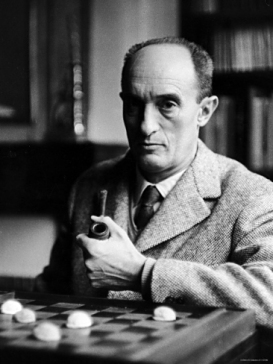Pierre Boulle (1912-1994)
– Creator of the Planet of the Apes –
 |
| By Source (WP:NFCC#4), Fair use, Link |
An engineer by profession, who worked as a technician on British rubber plantations in Malaya during the 1930s, he joined the Free French Forces under Charles de Gaulle upon the outbreak of World War II. He worked with resistance movements in China, Burma, French Indochina until his capture, in 1943, by Vichy France loyalists on the Mekong River. He was imprisoned and subjected to severe hardship and forced labour, which he would later write about in the form of a highly successful autobiographical novel, Le Pont de la Rivière Kwai.
After the war, Boulle resumed his previous occupation for a time but, by 1949, had returned to his native France, living in Paris where he sought to make a name for himself as a writer. The success of his literary output is overshadowed only by the success achieved by adaptations of his work for cinema. Today, his reputation rest chiefly on two works, The Bridge over the River Kwai (first published in French, in 1952, as Le Pont de la Rivière Kwai) and Planet of the Apes (first published in French, in 1963, as La Planète des singes), both of which were made into award-winning films by Hollywood studios.
 |
| By Source, Fair use, Link |
 |
| By Source, Fair use, Link |
The planet in the novel is a different planet to Earth although, the ending is not without a wry, sardonic twist, emulated only by the climactic finale evoked by Rod Serling and Charlton Heston in the film adaptation. Furthermore, the apes whom the astronauts from present-day Earth encounter, inhabit a civilised milieu though, one that is not without contradictions, including a certain capacity for casual cruelty.
Pierre Boulle died in Paris, France on 30 January 1994, aged 81. His total literary output amounts to some 30 novels and short story collections. A website dedicated to his life and work is operated by «Les amis de l'œuvre de Pierre Boulle».

No comments:
Post a Comment